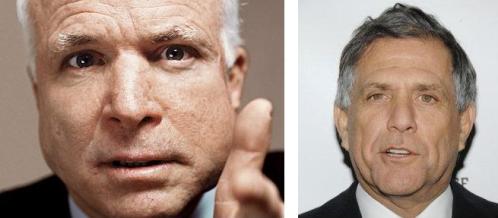RED MEAT: TV Upfront Coverage; Yahoo! Can't Catch A Break; Head-Scratching Deals; Data Wars Spark Between Facebook, MySpace, and Google; Political Steel Cage Matches - MediaBizBuzz for May 19

This year's Upfronts were a modest affair. Perhaps they reflected the Zeitgeist, skewing lean and mean as the U.S. economy continued to be soft. After fending off Microsoft's Steve Ballmer, Jerry Yang learned that there was no rest for the weary as corporate raider Carl Icahn let it be known that he wanted the merger to go through - even if he had to single-handedly replace Yahoo's entire board. Amid that soap opera were a pair of deals that left the punditry divided: CBS's $1.8B pick up of CNET and Cablevision's acquisition of Plaxo. Last week Facebook, MySpace and Google simultaneously launched portable data initiatives, inadvertently starting an arms race to "own" the most users. In record time they've come to blows with Facebook launching a denial of service attack on Google's Friend Connect service. In the political sphere, no sooner did Hillary Clinton take West Virginia by 40 points, that John Edwards' endorsement of Barack Obama all but erased her victory. But whatever residual bitterness remained among Democratic factions seemed to vanish at George Bush's veiled "appeasement" attack of Obama in front of the Israeli Knesset. Does human nature require a common enemy to unite? And is adversity a requisite for evolutionary growth?
Lack of content -- owing to the Writers Strike -- at the Upfronts meant that networks took different tacts at showing themselves off to best advantage. Turner promised relevant ads - just like the Web! Fox promised 50% less ads - Remote Free TV - for its fall show, Fringe. NBCU leveraged its brand equity and Ed Martin weighed in as to their efforts. The CW's Dawn Ostroff curated a stylistic affair, designed for the 18-34 demo and our Nina Spezzaferro thought it was on-the-mark. NBC's announcement that it was going to take WNBC-NY and make it hyperlocal, in the vein of NY1, didn't sit well with Charlie Warner. Jack Myers broke with his tradition of forecasting Upfronts, stating outright that: "The Upfront is no longer a representative indicator of network performance and the information released by the networks is, at best, questionable." For our entire coverage of the week, go HERE. If you've two minutes, rate your Upfront experience.
If the Upfronts were less about the Bling, Yahoo! faced intrigues that were positively Byzantine. After Icahn made his position known, there was a continuum of response. Marketwatch's John Dvorak didn't mince words, he thought that Icahn would destroy Yahoo! Mark Cuban - one of those named to be on Icahn's replacement Board - made mischief, positing a scenario where Google could be cockblocked as a search advertising seller. Silicon Alley Insider's Henry Blodget painted a scenario where Icahn would lose a proxy fight. TechCrunch, unbidden, advised on how to structure a Google deal that would insulate Yahoo. Sunday night paidContent was reporting that MSFT and Google were talking again. Apparently, the Devil you do know is better than the devil you don't...
The day after its Upfront CBS raised a few eyebrows with its acquisition of CNET for $1.8B. TechCrunch's Michael Arrington dissed the deal out of the gate; Cynthia Blumfield didn't get it. Madison Avenue, however, cottoned to it. Jupiter let on that they might be onto something if they could sell adds across this broader audience. All Things D's Kara Swisher viewed the deal as an analog for Yahoo!'s final act. The most insightful take, following on the protracted closing of the Clear Channel sale, was offered by paidContent's Steven Rosenbush who looked at the CBS/CNET play as the "signature deal of 2008" - a manageable acquisition that CBS could pay in cash, unlike the Clear Channel sale which was an elephant. From Les Moonves himself: "This is a great way to jump start our position in the internet world." Contradicting itself, TechCrunch here gives kudos to what it refers to as CBS's Superdistribution strategy. Should CBS get the benefit of the doubt where CNET is concerned, CondeNast's purchase of Arstechnica for a rumored $25M looks genius - it's a destination for smart coverage of technology and will fit well into Wired Digital - such a deal! Just on the radar: Best Buy is a-courting Netflix. Silicon Alley Insider likes the sound of that.
With the upcoming release of Sex and the City: The Movie, the Financial Times has a hoot of a time, using the show as a metaphor for the entertainment industrywrit large. In its view, paid-for still trumps free, small box beats big box, and adults outgun teenagers. This much is true, the currency of the HBO brand is such that it put a dent in the iTunes store's inflexible pricing structure with some episodes going for $2.99. Details here. But the L.A. Times has a bone to pick with the premium channel, saying that it had a failure of nerve. Rather than shakeup the industry model, it plays it safe, not upending its preexisting deals with DVD release or being as forward-looking as rival Showtime.
Turning to the first strikes in the War Over Data Citizenship, TechCrunch publishes a debate among the Gillmore Gang. Tempers flare, with most holding that Facebook has put themselves in a no-win situation. This coincides with Fortune's less than flattering portrait of Facebook's financial picture. Here's Facebook's spin: We're the Cable of the Internet. Really.
Technology continues to befuddle both the judiciary and lawmakers. While Congress took the step of registering disapproval after the FCC rollback of cross-ownership rules, it looks like any attempt to undo the decision will be met by veto pen. The RIAA learned that a recent ruling - that "making available" content constituted infringement -- was incompatible with a binding precedent. A mistrial will likely result. Strangest of all is the trial over the MySpace suicide (where members of a family masqueraded as an amorous boy, only to harass a teen to her end) where the U.S. Attorney's Office in L.A. -- overreaching since no applicable law is on the books -- is using a Terms of Service (ToS) violation as a way to prosecute. Think of that precedent. How many of us readToS agreements anyway?
The mobile space has been flexing its muscle of late. The Times describes the technology (available in South Korea since forever) where Live TV can be seamlessly offered on phones. AT&T details enhancements to its infrastructure for early 2009. Dish Networks is looking for a partner for the mobile spectrum it purchased for a cool $712M -- no doubt its hurting with steep declines in its subscriber base. Techdirt offers a word of caution to the recording industry that is now looking to mobile as its savior: Don't - P2P will happen soon. Actually, it's already here: CloudTrade is offering legal P2P songs by two indie record labels; it's also in talks with UMG. Perhaps SonyBMG is striking the right balance. It's entered into an agreement with Dada Entertainment to offer DRM-less full-length MP3s; Dada has a $9.95/mo subscriber fee.
As we inch closer towards the general election John McCain can be seen as the carbon version of "old media" contesting the new. On Saturday Night Live's season finale he tried a little jujitsu, urging the American people to place their trust in someone "very, very old." Did his strategy win the day? Decide for yourself.


